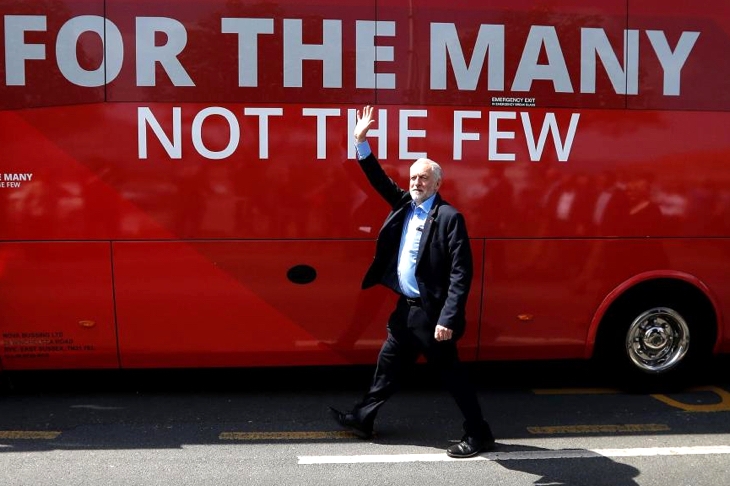Jeremy Corbyn’s speech today in which he confirmed that a Labour government would keep Britain in a Customs Union with the EU was about so much more than trade. It was about the future of the Labour party itself. It sent a clear message about what, and more importantly who, Labour is for these days. It confirmed that Labour has finally made its choice between which of its two, quite conflictual support bases it will represent in public life: the better-off ones, the middle-class ones, the Southern ones.
This is what Labour’s cosying up to the idea of a Customs Union — which is a betrayal of Brexit, whatever Labourites say to the contrary — really tells us. That Labour has decided to veer away from its working-class backers in the old industrial heartlands, who tend to be Brexiteers, and instead to do the bidding of its better-educated, better-connected supporters in the South and other plush parts of Britain, who tend to be Remainers. What Corbyn did today feels almost as significant as Tony Blair’s ditching of Clause IV of the Labour party’s constitution: it further signals Labour’s shift away from the people it was founded to represent and its transformation into a campaigning tool of the new middle-class elites.
Those who claim that maintaining a Customs Union after Brexit is not a betrayal of Brexit are kidding themselves, and they know they are. Labour can call this ‘a’ Customs Union rather than ‘the’ Customs Union as much as it likes, but everyone knows that a Customs Union with the EU will necessitate Britain accepting limitations on its ability to negotiate and decide how it trades with nations around the world. That is, the thing 17.4m people voted for — to take back control, to democratise political decision-making on law, migration and trade — will be undermined. The sovereignty that the largest group of voters in British history demanded — including millions of working-class voters in Essex, Stoke, Merthyr Tydfil — will be diluted.
As to the idea that the Brexit vote wasn’t necessarily a vote against the Single Market or the Customs Union, just against Brussels, this has always been a surreal claim. The Customs Union is a central component of the EU. It is the creation of EU treaties; it is coded into the dead bureaucratic heart of the Brussels machine. In rejecting the EU, we rejected the Customs Union, it’s as simple as that. And to say otherwise would be like arguing that the defeat of the Tories in a General Election wasn’t a vote against everything about the Tories and therefore we should keep five or six of them in the Cabinet. It is nakedly anti-democratic. Labour has just made clear that if it gets into power, it will weaken Britain’s largest ever vote; it will deny voters what they asked for: a withdrawal from the EU.
Labour MP Frank Field is right that Corbyn has caved in to ‘anti-Brexit plotters’ and that this betrayal of the substance and meaning of the Brexit vote will make voters feel that the ‘political class has stuck two fingers up at them’. How extraordinary that Corbyn, supposed radical, who rallies behind the slogan ‘For the many, not the few’, should now spearhead the political class’s creeping sell-out of the loudest cry of ‘the many’ in British history. Even Tory rebels now love him. So does George Osborne. Indeed, Corbynistas will surely be wondering at the wisdom of what they have done when they see that their bete noire Osborne is singing their praises. Corbyn has made Labour more ‘pro-business’ than the Tories, he says, and he’s not wrong. The business elite loves the EU. It’s ordinary people who dislike and distrust it. Corbyn’s Labour is now the party of the few, not the many.
This betrayal of Brexit is, more fundamentally, a betrayal of the working classes. It is a betrayal of the idea that ordinary people, whatever their station, whatever their wealth, whatever their educational achievement, should democratically decide the fate of the nation. Corbyn has been captured by the noisy, angry middle-class anti-Brexit set and has agreed to throw Labour’s lot in with them. Nothing in recent years has signalled Labour’s turn away from its old voters than this. Labour is no longer a party for the working class — it is a party against the working class.







Comments